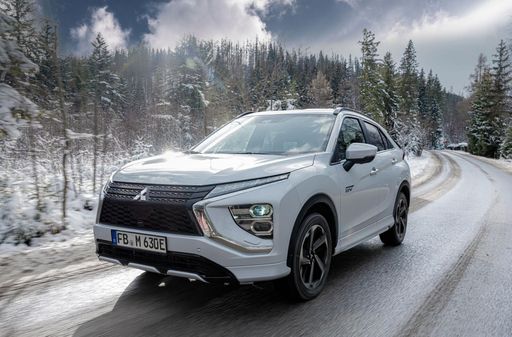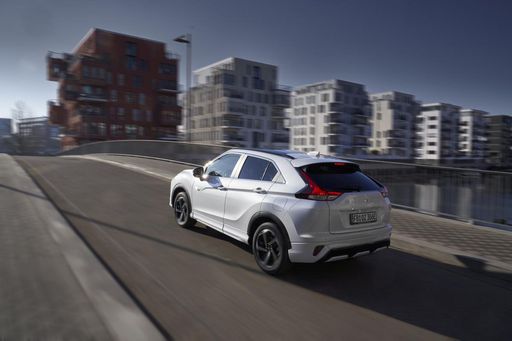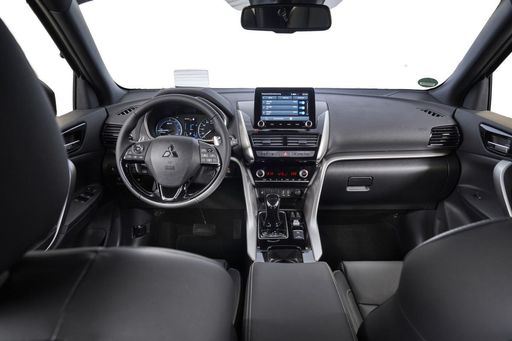Mitsubishi Eclipse Cross vs VW Tiguan – Differences & prices compared
Compare performance, boot space, consumption and price in one view.
Find out now: which car is the better choice for you – Mitsubishi Eclipse Cross or VW Tiguan?
The Mitsubishi Eclipse Cross (SUV) comes with a Plugin Hybrid engine and transmission. In comparison, the VW Tiguan (SUV) features a Plugin Hybrid, Petrol, Petrol MHEV or Diesel engine with Automatic transmission.
When it comes to boot capacity, the Mitsubishi Eclipse Cross offers 359 L, while the VW Tiguan provides 652 L – depending on how much space you need. If you’re looking for more power, decide whether the 188 HP of the Mitsubishi Eclipse Cross or the 272 HP of the VW Tiguan suits your needs better.
In terms of consumption, the values are 2 L per 100 km for the Mitsubishi Eclipse Cross, and 0.40 L for the VW Tiguan.
Price-wise, the Mitsubishi Eclipse Cross starts at 36000 £, while the VW Tiguan is available from 32800 £. Compare all the details and find out which model fits your lifestyle best!
The Mitsubishi Eclipse Cross brings a bold design with its sloping roofline and distinctive front fascia, appealing to those who prioritize style and agility in their drive. In contrast, the VW Tiguan offers a more spacious and practical approach, combining robust German engineering with a roomy interior perfect for families. While the Eclipse Cross impresses with its modern tech features, the Tiguan excels in offering a driving experience that blends comfort with enduring performance.
Mitsubishi Eclipse Cross
The Mitsubishi Eclipse Cross presents a sleek fusion of dynamic design and versatile functionality, perfect for urban adventures and weekend getaways alike. Its elegant lines and bold front grille make a strong statement on the road, while its well-appointed interior offers a comfortable and connected driving experience. With advanced safety features and intuitive technology, the Eclipse Cross ensures drivers feel secure and in control, whether navigating city streets or scenic routes.
details @ Mitsubishi Motos
@ Mitsubishi Motos
 @ Mitsubishi Motos
@ Mitsubishi Motos
 @ Mitsubishi Motos
@ Mitsubishi Motos
VW Tiguan
The VW Tiguan presents itself as a versatile and practical option in the SUV market, combining a stylish design with a spacious and comfortable interior. It offers a smooth driving experience, making it well-suited for both urban environments and longer journeys. With its focus on safety and innovative technology features, the Tiguan remains a compelling choice for families and adventurers alike.
details @ Volkswagen
@ Volkswagen
 @ Volkswagen
@ Volkswagen
 @ Volkswagen
@ Volkswagen
 @ Volkswagen
@ Volkswagen
 @ Volkswagen
@ Volkswagen
 @ Volkswagen
@ Volkswagen
The Battle of the Compact SUVs: Mitsubishi Eclipse Cross vs. VW Tiguan
In today's bustling automotive market, the SUV remains a dominant force, vying for attention through its multifaceted functionality and style. Among the many contenders, the Mitsubishi Eclipse Cross and the VW Tiguan stand tall, each touting its unique attributes. Whether you're an eco-conscious driver or a speed enthusiast, let's delve into what these two vehicles offer.
Technical Titans: Power and Performance
When it comes to raw performance, the Mitsubishi Eclipse Cross houses a sophisticated Plugin Hybrid system churning out 188 HP (138 kW). Equipped with an all-wheel-drive, this Japanese-engineered SUV takes you from 0 to 100 km/h in 10.9 seconds. With a top speed capped at 162 km/h, it blends utility and efficiency well, featuring a remarkable fuel consumption of just 2 L/100 km. The Eclipse Cross also flexes a modest electric range of 45 km, perfect for short, eco-friendly trips.
On the flip side, the VW Tiguan doesn't shy away from showcasing an array of powertrain options. Engine choices range from a 130 HP (96 kW) petrol engine to an impressive 272 HP (200 kW) for the adrenaline junkies, with a 0-100 km/h time of just 5.9 seconds in its more powerful variants. Its top speed can soar up to 242 km/h. The Plugin Hybrid version offers a robust electric range of up to 113 km, appealing to those sensitive to emissions without sacrificing performance.
Design and Dimensions: Space vs. Style
The Mitsubishi Eclipse Cross, with dimensions measuring 4545 mm in length, 1805 mm in width, and 1685 mm in height, offers a comfortable yet sporty ride. Its body design signifies robustness with a touch of elegance, suitable for both urban and off-road adventures. However, its trunk capacity stands at a modest 359 liters, indicating a slight compromise on storage space.
The VW Tiguan takes a distinctly European approach in design, accentuating elegance and spaciousness. Measuring 4539 mm in length, with width options of 1842 to 1859 mm and height around 1658 mm, it presents a balanced and visually appealing profile. Superior in cargo capacity, the Tiguan offers up to 652 liters in its petrol version, making it an ideal choice for family outings and adventures.
Green Efficiency and Innovative Technologies
On the environmental front, the Eclipse Cross strikes a more eco-friendly chord with a CO2 efficiency class B and emissions of 46 g/km. Its Plugin Hybrid architecture allows drivers to indulge in the luxury of sustainable driving without guilt, complemented by a CO2-efficient engine capacity of 2360 cm3.
Meanwhile, Volkswagen pushes boundaries further with its wide-ranging powertrains, but with varying CO2 efficiency classes from E to G, consumers may need to carefully choose models to best meet their green aspirations. Nevertheless, the inclusion of a 19.7 kWh battery in the PHEV version facilitates significant electric-only travel, reflecting Volkswagen's continuous commitment to innovation.
Conclusion: Choosing Your Optimal SUV Partner
The Mitsubishi Eclipse Cross and the VW Tiguan each target a unique audience within the bustling SUV segment. While the Eclipse Cross captures the attention of those prioritizing hybrid efficiency and a comfortable ride, the VW Tiguan's versatile power options and greater cargo capacity appeal to performance-driven familial needs. Between practicality, technological innovation, and design, the choice ultimately depends on personal preference and priority. As always, test drives and personal preferences will play a crucial role in selecting the perfect automotive companion.

|

|
|
|
|
Costs and Consumption |
|
|---|---|
|
Price
36000 - 41800 £
|
Price
32800 - 51000 £
|
|
Consumption L/100km
2 L
|
Consumption L/100km
0.4 - 8.5 L
|
|
Consumption kWh/100km
-
|
Consumption kWh/100km
-
|
|
Electric Range
45 km
|
Electric Range
119 - 129 km
|
|
Battery Capacity
-
|
Battery Capacity
19.70 kWh
|
|
co2
46 g/km
|
co2
8 - 193 g/km
|
|
Fuel tank capacity
43 L
|
Fuel tank capacity
45 - 58 L
|
Dimensions and Body |
|
|---|---|
|
Body Type
SUV
|
Body Type
SUV
|
|
Seats
5
|
Seats
5
|
|
Doors
5
|
Doors
5
|
|
Curb weight
1985 - 2052 kg
|
Curb weight
1599 - 1890 kg
|
|
Trunk capacity
359 L
|
Trunk capacity
490 - 652 L
|
|
Length
4545 mm
|
Length
4539 mm
|
|
Width
1805 mm
|
Width
1842 - 1859 mm
|
|
Height
1685 mm
|
Height
1656 - 1658 mm
|
|
Payload
373 - 440 kg
|
Payload
460 - 533 kg
|
Engine and Performance |
|
|---|---|
|
Engine Type
Plugin Hybrid
|
Engine Type
Plugin Hybrid, Petrol, Petrol MHEV, Diesel
|
|
Transmission
-
|
Transmission
Automatic
|
|
Transmission Detail
-
|
Transmission Detail
Dual-Clutch Automatic
|
|
Drive Type
All-Wheel Drive
|
Drive Type
Front-Wheel Drive, All-Wheel Drive
|
|
Power HP
188 HP
|
Power HP
130 - 272 HP
|
|
Acceleration 0-100km/h
10.90 s
|
Acceleration 0-100km/h
5.9 - 10.6 s
|
|
Max Speed
162 km/h
|
Max Speed
198 - 242 km/h
|
|
Torque
-
|
Torque
220 - 400 Nm
|
|
Number of Cylinders
4
|
Number of Cylinders
4
|
|
Power kW
138 kW
|
Power kW
96 - 200 kW
|
|
Engine capacity
2360 cm3
|
Engine capacity
1498 - 1984 cm3
|
General |
|
|---|---|
|
Model Year
2021 - 2022
|
Model Year
2024 - 2025
|
|
CO2 Efficiency Class
B
|
CO2 Efficiency Class
B, G, D, E, F
|
|
Brand
Mitsubishi
|
Brand
VW
|
Mitsubishi Eclipse Cross
Unveiling the Mitsubishi Eclipse Cross: A Pioneer in Innovation
The Mitsubishi Eclipse Cross has captivated the automotive world since its introduction. This SUV merges the heritage of Mitsubishi's Eclipse sports coupe with the robust aesthetics of a modern crossover, creating a vehicle that stands out both on urban roads and open highways. Let's delve into the innovative features and technical details that define this remarkable vehicle.
Powerful Hybrid Performance
At the heart of the Mitsubishi Eclipse Cross is its cutting-edge plug-in hybrid engine. With a power output of 188 PS (138 kW), this hybrid marvel combines a traditional 2.4-litre petrol engine with an advanced electric motor, delivering an impressive fuel economy of just 2 litres per 100 km. Not only does it offer optimal performance, but it also commits to eco-friendliness with a CO2 emission rated at a mere 46 g/km.
All-Wheel Drive for Unmatched Control
The Eclipse Cross comes equipped with an all-wheel-drive system, ensuring traction and stability across various terrains. This is particularly beneficial for drivers who venture beyond the smooth highways, providing confidence and control whether you're tackling slippery city streets or rugged countryside trails.
Design and Comfort: A Fusion of Style and Practicality
The striking design of the Mitsubishi Eclipse Cross is a fusion of style and functionality. Its dimensions, 4545 mm in length, 1805 mm in width, and 1685 mm in height, contribute to a spacious interior without compromising on an elegant silhouette. This SUV comfortably seats five passengers and boasts a generous boot space of 359 litres, ideal for family getaways or adventure trips.
Technological Advancements for Modern Drivers
Mitsubishi has integrated several technological advancements into the Eclipse Cross to enhance driving experience. The model offers an electric range of 45 km, perfect for daily commutes or short journeys without engaging the conventional engine. Additionally, its user-friendly infotainment system ensures connectivity and entertainment on the go.
Safety Features: Protecting What Matters Most
Safety is paramount in the design of the Eclipse Cross. It includes a selection of contemporary safety features to protect both passengers and pedestrians. With a CO2 efficiency class rated at B, it not only aims to safeguard its passengers with advanced collision mitigation systems but also to ensure a greener and more sustainable driving experience.
Value for Money: The Perfect Investment
Positioned with a price range between €41,990 and €48,990, the Mitsubishi Eclipse Cross offers substantial value considering its hybrid technology and comprehensive feature set. Additionally, with monthly costs ranging from €1,165 to €1,258 and cost per km between 46.6 and 50.3 cents, it is an economically sound choice for eco-conscious drivers looking for an efficient and reliable vehicle.
In conclusion, with its blend of hybrid power, all-wheel-drive capability, and a focus on innovation and safety, the Mitsubishi Eclipse Cross is an ideal candidate for those seeking a versatile and efficient SUV. Whether you're navigating city streets or cruising countryside roads, the Eclipse Cross promises a drive that is both exhilarating and responsible.
VW Tiguan
Introducing the VW Tiguan: A Blend of Style and Innovation
The VW Tiguan has consistently been a popular choice among SUV enthusiasts, combining practicality with a touch of elegance. In the latest iteration, Volkswagen has continued this tradition with a range of technical updates and innovations.
Powertrains: Versatility Meets Efficiency
The VW Tiguan comes with a variety of engine options, catering to different preferences and needs. From the efficient petrol mild-hybrid variants to the environmentally friendly plug-in hybrids, and the robust diesel engines, there is something for everyone. The power output ranges from a modest 130 PS to an impressive 272 PS, ensuring that drivers can enjoy a powerful and dynamic driving experience.
Innovation remains at the heart of the Tiguan’s engineering. The plug-in hybrid models, for example, boast an electric range of up to 113 km, making them ideal for those looking to reduce their carbon footprint while still enjoying the flexibility of a traditional engine.
Advanced Transmission and Drivetrain
Equipped with a smooth and responsive automatic transmission, the Tiguan ensures a comfortable drive. The dual-clutch gearbox provides quick and seamless gear changes, enhancing the driving experience. Additionally, the Tiguan is available in both front-wheel and all-wheel drive configurations, offering excellent traction and stability across different driving conditions.
Performance and Efficiency
The Tiguan's performance capabilities are complemented by its efficiency. With fuel consumption as low as 0.4 L/100km for hybrid models, owners can enjoy long trips with fewer stops for refuelling. The CO2 emissions are also impressively low, aligning with modern environmental standards and expectations.
Design and Dimensions
The Tiguan’s aesthetic appeal is undeniable, with a robust character that exudes confidence and sophistication. Its dimensions—4,539mm in length, 1,842 to 1,859 mm in width, and up to 1,658mm in height—provide ample interior space, making it a versatile vehicle for families and adventure seekers alike.
Practicality is further emphasised by its sizeable boot space, ranging from 490 to 652 litres, ensuring plenty of room for luggage or shopping.
Safety and Technology
Volkswagen has not compromised on safety or technology. The Tiguan is equipped with the latest driver assistance systems, ensuring a safe journey for its occupants. Features like adaptive cruise control, lane assist, and emergency braking provide an extra layer of protection.
Pricing and Value
Starting from €38,250 to €59,535, the Tiguan offers a range of specifications and features to match different budgets. When considering the advanced technology, engine options, and the premium feel of the cabin, it presents excellent value for money.
Conclusion: The Ultimate SUV Experience
The VW Tiguan continues to impress with its blend of innovative technology, performance, and practicality. Whether you’re looking for an eco-friendly hybrid with a long electric range or a powerful diesel for longer hauls, the Tiguan provides an all-encompassing solution. With its refined design and superior comfort, it remains a leading choice in the SUV segment.
Which drive types are available for the Mitsubishi Eclipse Cross?
Available as All-Wheel Drive.
The prices and data displayed are estimates based on German list prices and may vary by country. This information is not legally binding.
